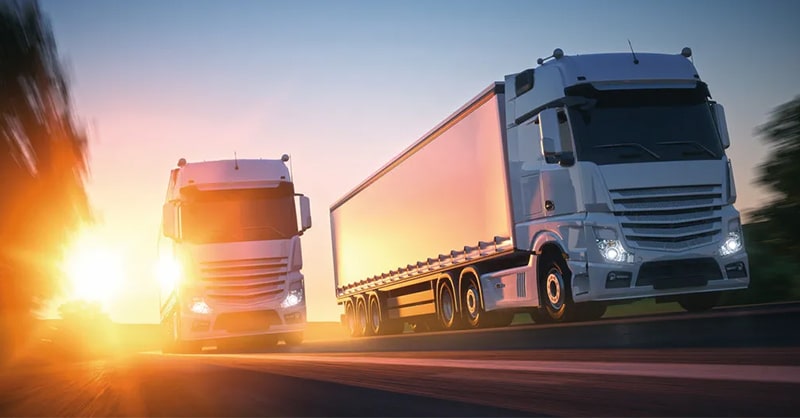Top telematics trends in 2022 and beyond
In today’s growing digital landscape, the success of many companies will rely on advanced software tools and systems that optimise business operations.
As for the fleet industry, this is no exception.
Vehicle tracking and telematics systems are undoubtedly a part of successful fleet management and customer success.
Businesses need ground-breaking tech to optimise operations, monitor fuel consumption, and maintenance costs, to name just a few.
Here are some telematics trends of 2022 that’ll help keep your business relevant.
But first, how relevant is the telematics industry?
According to Fortune Business Insights, the global vehicle telematics market size is projected to grow to USD 179.50 billion in 2028.
Through telecommunication and information technology, telematics is being used across various industries for top transportation and logistics purposes.
What are the different types of telematics for your fleet?
With innovative fleet technologies on the rise, companies will need to select an ideal telematics solution for their vehicles.
These are some of the telematics solutions currently out there:
- On Board Diagnostics (OBD) II
This is a port in a vehicle that allows a user to retrieve valuable data like the vehicle’s speed, engine performance, and more. A portable fleet telematics device will connect to the OBD port. OBD-II telematics devices transmit in-vehicle data to the base station to be processed and utilised in fleet management software.
- Smartphone-based
The smartphone mobile apps receive data via Bluetooth-enabled in-vehicle sensors and provide customised vehicle tracking options. The latest smartphones are equipped with a (GPS) receiver and offer a variety of services for capturing, storing & processing real-time data.
- Hard wired devices
These are secure and hard-fitted into the vehicle, connected to the vehicle’s electronics, and powered by the vehicle’s battery. The telematics control unit sends critical telematics data over wireless infrastructure.
What are three benefits for companies that use telematics?
- Improved fleet operations
There are many areas of a fleet business that can expand to the next level. A telematics solution will provide actionable data insights, so you can make the best possible operational decisions for your business. For instance, the data will give insight into ways to improve fleet maintenance, which leads to preventing roadside violations, minimising vehicle downtime, increasing driver awareness, and improving maintenance costs.
- Enhanced Security
GPS vehicle monitoring lets you see if your asset is in the right place, and is essentially the first security step in keeping your vehicle safe. However, it’s the telematics technology and frameworks that can take your fleet’s security to another level.
Here are some examples of telematics safety features:
- Truck theft prevention: Keep track of driver IDs, route deviations, and unauthorised stops, to prevent your drivers from going into high danger zones. Notifications and alerts will be sent to warn fleet managers accordingly.
- Driver safety: In the unfortunate event of your driver being assaulted, you will be alerted and be able to react immediately, to protect your driver and vehicle. Get notifications with the driver’s location and other information straight away, by the press of a panic button.
- Safe driving methods: A telematics platform gives all kinds of information about driver behaviour such as harsh driving, and excessive idling which can be used to mitigate road accidents and promote healthy driving patterns.
- Increased cost management and revenue
Businesses have the opportunity to unveil weak spots in their operations and make them better overall. This can only bring more customers into the business, maintain a competitive advantage, and delight existing customers with service excellence. Sometimes it might be difficult to pinpoint these challenges, which is why fleet management systems will do the work for you.
Perhaps admin processes are lacking, and the platform will organise it better for you. Or maybe there are fuel discrepancies you just can’t explain. In this case, you will get insight into how you can monitor your fuel consumption, in addition to other fuel-saving factors, such as fuel card theft and fraud.

10 telematics trends to watch out for in 2022
- Improvements in driver behaviour
There is a strong focus on monitoring the behaviour of drivers in the fleet industry and empowering them to improve their driving methods. Companies understand that this contributes positively to overall fleet performance and business profits, and vehicle telematics systems will help them achieve this. They will always need all sorts of real-time information such as harsh speeding, sharp turns, hard braking, and excessive idling to prevent accidents and improve fuel consumption in the process.
- The Internet of Things (IoT)
IoT brings internet connectivity, data processing, and analytics to the world of physical objects.As a result, devices can be interconnected and communicate with one another to give users a unique experience, and develop business operations.
IoT solutions are a telematics trend in fleet management solutions to allow every aspect of fleet operations to be managed efficiently, with the exchange of real-time data.
For example, a fleet business transporting cargo that needs temperature regulation can benefit from IoT technology. Sensor devices give out data if there are unwanted fluctuations in temperature, and managers will be alerted through the telematics fleet platform.
- 5G expands connectivity
According to experts, the use of 5G wireless integrated into smart transportation will thrive by 26% annually over the coming decade, reshaping the future of the vehicle telematics market.
What’s the 5G fuss about? The technology is fast, with more bandwidth, lower latency, and increased reliability. It can create new opportunities in vehicle connectivity and monitoring.
Low-latency 5G tech has allowed automakers to deliver advanced features in Advanced Driver-Assistance Systems (ADAS) such as fuel-tracking, real-time navigation and communication, speed and cruise control, and better fleet management.
It also assists fleet managers to monitor and control the parameters from remote locations via smartphones.
- Reduced maintenance costs and improved productivity
Any way fleet managers can save and improve their business, will always be a hit.
Cutting on maintenance costs is an increasing trend because it reduces breakdowns, unnecessary downtime, and expenses keeping profits on the rise.
A telematics system allows fleet managers to adopt a proactive approach to maintenance, and get real-time information on vehicle mileage, alerts for maintenance scheduling, and more. It’s an affordable way to run well-maintained vehicles and prevent costly repairs later on.
- Actionable data insights
Getting lots of data and diving into what it means, and then taking action is the core of what effective fleet management is all about. It will always be an ongoing trend, and a software platform such as Cartrack strives to give out the best insights possible, through advanced telematics.
Simultaneously, cloud technology is needed to store, handle, and process large amounts of data. Thanks to the cloud, fleet owners can access data from anywhere and at any time.
Historical data can also be pulled out from the platform to analyse all kinds of business tasks.
Ultimately, the data will be used to make actionable decisions to streamline processes and ensure the business is always up to speed.
- Remote fleet management
The way we do business and working culture has shifted since the global pandemic. With the demands of day-to-day operations, fleet managers are always looking for ways to make their lives easier.
A remote-friendly system gives them the flexibility they need to keep on top of activities, from a distance.
For instance, a software platform lets managers communicate in real time with drivers and manage their fleets from a computer or via an app on their phones.
They can check on the status of deliveries, and locate where their fleet and drivers are, from anywhere, at any time.
- Data security
The reliance on technology and data transmission makes vehicles potentially more vulnerable to hacking and cyber-attacks.
And with Cyber attacks on the rise, fleet owners will need to ensure their sensitive data is protected. In 2022 and beyond, they will need to install devices and software from a trusted brand such as Cartrack.
Training staff on security measures to improve their fleet’s safety is also a persistent trend.
- Optimised fleet safety
Advanced fleet safety measures will always be one of a fleet manager’s priorities. They seek the appropriate technology that will give them the insight to implement safe driving methods, prevent vehicle theft, avoid accidents, and more. AI camera technology solutions are also on the rise, as fleet managers use high camera systems to monitor and keep drivers, fleet, and cargo safe. AI-based vehicle video cameras are used to identify risky driving, and drivers can be alerted about potential safety violations so they can correct them immediately.
- Electric vehicles
The sale of EVs (electric vehicles) increased in 2021, and the trend is yet to grow further. EV companies are finding ways to make communication and data sharing easier with fleet software. These vehicles also offer lower preventative maintenance, emissions, and fuel costs, so there’s no question that companies will consider these in the near future.
- Telematics tracking
GPS telematics tracking isn’t going anywhere, any time soon. Real-time tracking and diagnostics make it easy for companies to track their drivers’ locations, and driving habits and give other data insights to benefit their entire fleet.

The future ahead
As technology develops, so too will the telematics industry grow exponentially.
With the evolution of technology including systems, hardware, software, and the power of 5G, businesses can meet the needs of their customers more effectively.
By embracing new trends, it will give fleet owners a competitive edge and be on top of all aspects of their vehicle fleet, with meaningful telematics insights.
Chat to Cartrack today to get the latest software solution that will keep you on top of vehicle telematics trends in 2022 and beyond.




